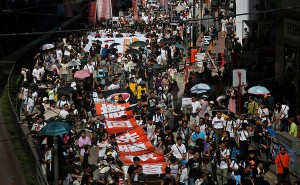UPDATE: You can see some wonderful photos of the demonstrations here.
Hong Kongers are demonstrating en masse as the CCP tries to shove down their throats a new student curriculum larded with Mainland propaganda. This is worse than the Creationist-modeled school curriculum instituted by the Texas Board of Education.
The new curriculum would be similar to the so-called patriotic education taught in mainland China. The materials, including a handbook entitled “The China Model,” describe the Communist Party as “progressive, selfless and united” and criticize multiparty systems, even though Hong Kong has multiple political parties.
Critics liken the curriculum to brainwashing and say that it glosses over major events like the Cultural Revolution and the Tiananmen Square crackdown. It will be introduced in some elementary schools in September and be mandatory for all public schools by 2016.
Talks between the education minister, Eddie Ng, and the National Education Parents’ Concern Group broke down on Saturday. Mr. Ng later denied that the curriculum was akin to brainwashing.
One demonstrator, Elaine Yau, who was there with her 7-year-old daughter, said that people wanted a say in what was taught in the schools. “We feel like we have no choice,” she said.
One point of contention is that many of the city’s governing elite send their children to the West or to expensive foreign-run international schools, which will be exempt from the national education. The curriculum will be mandatory for the public schools used by most of the working and middle classes.
This part then took the cake. Leave it to a pro-Beijing official to say exactly the wrong thing.
Before the protest, Jiang Yudui of the pro-Beijing China Civic Education Promotion Association of Hong Kong added fuel to the fire when he told Hong Kong’s residents that the curriculum should “wash their brains.”
“A brain needs washing if there is a problem, just as clothes need washing if they’re dirty, and a kidney needs washing if it’s sick,” he said, according to the local news media.
In response, protesters waved flags showing a cartoon brain with a line crossed through it. “No thought control! Preserve one country, two systems!” they chanted, referring to the agreement that gives Hong Kong political rights that are not allowed on the mainland.
So there we have it. The dirty brains of Hong Kong kids need a little washing. At least he admits it. Big congratulations to the 32,000 HKers who care enough to demonstrate in public over it. Of course, the pro-Beijing leaders are saying their decision is irrevocable no matter how many citizens take to the streets. I see this as ominous, vile and dictatorial. I can’t imagine Hong Kong ever cooperating, even if it becomes the law.
Some of us really believed there would be one country and two systems. We seem to have been wrong, though we knew that many years ago.

Comments